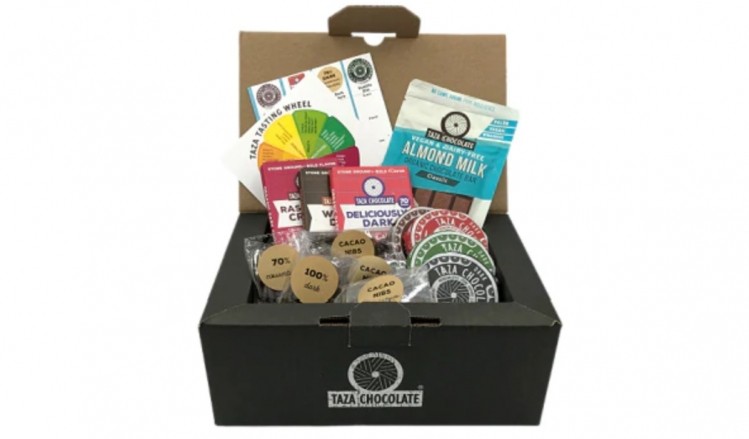Taza Chocolate celebrates milestone, shines light on industry

Co-founder and CEO Alex Whitmore acknowledges that one million pounds of chocolate may seem small compared to industry giants like Hershey that rolls out over a billion pounds a year, but it is momentous to a family-run business built on social and environmental responsibility, authenticity and transparency.
“The million-pound milestone we passed in 2021 was a goal we had that enabled us to have a greater impact economically,” he says.
“It of course starts with a big impact on our cocoa farmer community with our Direct Trade cocoa bean purchasing program. We are also able to employ a greater number of people here in Somerville and other places around the country.”
A pioneer in ethical cacao sourcing
Whitmore opened the Taza factory in Somerville, MA, with his wife and Taza Chief Design Officer Kathleen Fulton soon after learning how to make stone ground chocolate from molineros in Oaxaca, Mexico. Since then, the business has grown to 40 different products crafted with organic premium cacao beans that are sustainably sourced and minimally processed using traditional Mexican stone mills.
“No lab grown stuff here,” Whitmore says, adding that “Taza has always been certified organic, vegan and Direct Trade.”
Early on, Taza cut out intermediary cacao brokers and launched the chocolate industry’s first third-party certified Direct Trade sourcing program. It committed to paying small cacao producers at least $500 more per metric ton above the world market price, a 15 to 20% premium.
“Having this direct personal relationship gives us much greater control over quality, reduces supply chain challenges and establishes long-term partnerships with the families that make the primary ingredient we need to be successful,” Whitmore says.
Last year, Taza bought over 300 metric tons of beans for over $1 million, benefitting 2,269 farmers in Dominican Republic, Ghana and Haiti who are committed to fair labor and sustainable agroforestry practices. The company has published an annual transparency report since 2011, sharing key indicators and partner reports.
“Our hope is that by shining a light down the long roads in the cocoa supply chain we can make a more sustainable cocoa industry,” Whitmore says.
“The more consumers see companies like Taza show transparent pricing and trade practices, the more they will be expected and demanded of the large companies. Ultimately, this will create a better, more resilient cocoa supply chain and a stronger, healthier industry.”
Introducing certified-organic Haitian cacao
In 2015, Taza achieved another significant milestone. Partnering with cacao processor and exporter Produits des Isles SA (PISA) in the North of Haiti, it became the first chocolate maker to source organic-certified, premium Haitian cacao and bring it into the US.
“Taza was our first client, they were the first to give us a chance,” says Gilbert Gonzales, CEO at PISA.
“At the time, PISA was taking a big leap of trying to go for high quality fermented cacao. We were the first Haitian private entity to do this.”
The relationship has increased the visibility of Haitian chocolate in the US market and helped PISA expand its farmer network and business while significantly raising the farm gate price for producers.












